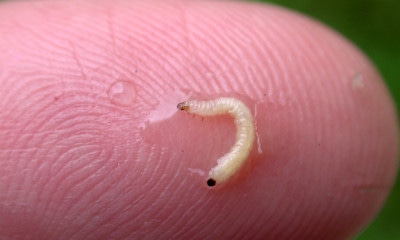
You may be tempted to go with a hybrid that has aboveground pest GMO traits but not below-ground traits if it will save you money. That would put rootworm issues back in play. Whether or not that is a big deal may depend on where you farm. It also may hinge on whether you can and will apply a rootworm insecticide or not.
“The most effective corn rootworm control is preventative with biotech traits or soil insecticides at planting,” says Jesse Grogan, an agronomist for LG Seeds, based in Lafayette. Grogan is also an Indiana Certified Crop Adviser.

WORTH THE RISK? Once you find this in your field, it’s too late. Rescue treatments are very ineffective for corn rootworm. (Photo courtesy of John Obermeyer, Purdue University Extension Entomology)
“Crop rotation and tillage do not control rootworm in northern and central Indiana. First-year corn rootworm after soybeans is established here,” he continues. “Exceptions where corn rootworm larvae do not survive are soils such as organic mucks, non-irrigated, coarse sands or tight, light-colored clays.”
Related: 5 ways to get a good stand when planting corn next month
If you farm in southern Indiana you’re likely not concerned unless corn follows corn. For the most part the variant that lays eggs in soybeans has not become widespread in southern Indiana. However, it has been detected and can cause issues in certain pockets, even in southern counties.
Grogan is based in northwest Indiana. It was hit hardest when the rootworm variant that can lay eggs in soybeans and attack first-year corn first appeared more than two decades ago. Greg Kneubuhler, owner of G & K Concepts, works on the opposite side of northern Indiana, located near Harlan. He is also a CCA.
“We’ve noticed rootworm pressures significantly subside in large portions of the state to the point of rootworm protection not being necessary,” he says. “However, you need to know your scenario. Not all parts of the state are in that position. We have seen a shift towards many conventional hybrids or not using insecticide.
“However, if you plant non-GMO corn or don’t use an insecticide and experience rootworm larvae feeding, there is little that can be done.”
Related: Head off Bt corn rootworm resistance in the Eastern Corn Belt
That is the part that concerns Grogan when he hears talk of skipping both the rootworm trait and the insecticide, especially in his area. He recognizes that heavy rains and flooding in early June the last couple of years in some places have reduced the overall corn rootworm threat in Indiana by killing young larvae before they find food in root tissues.
With all that said, he still believes pockets of heavy rootworm pressure exist within Indiana. “Don’t be lulled into eliminating corn rootworm protection in following years because it works one year,” he says.
If you’re relaying on seed treatments like Poncho 1250, Grogan says such an insecticide by itself is marginally effective in moderate to heavy rootworm pressure.
About the Author(s)
You May Also Like




